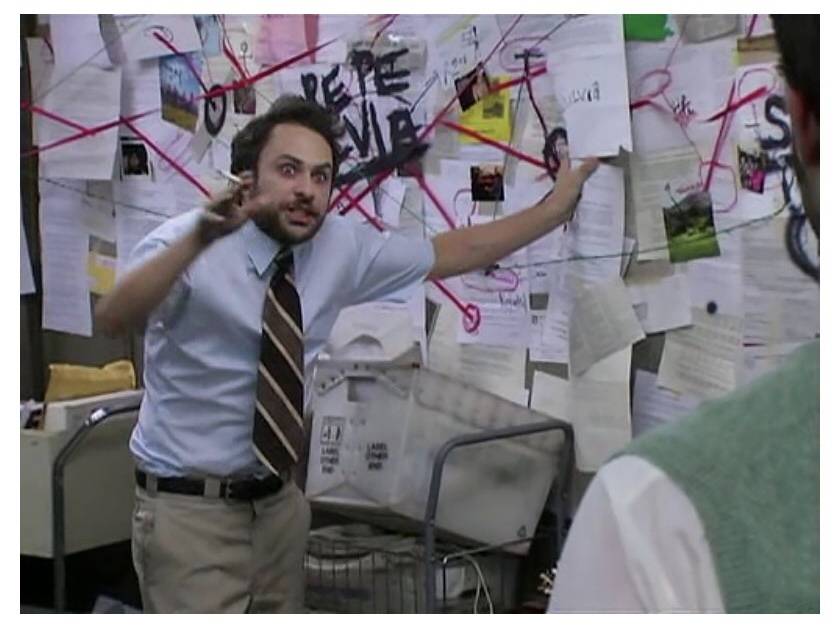I haven’t written much lately because, apparently, I don’t have much to say. But apparently I’m the minority. The analysts continue writing, whether or not they have anything to say. When it comes to commentaries on a war, or just about any other topic, there are two broad (but intertwined) categories: analysis and synthesis.
Over the past eight months, I have noticed that the vast majority of the commentary surrounding the Ukraine crisis isn’t worth the pixels it’s printed on. This is concerning and has far-reaching implications. If an “expert” opinion on the current war is trash, then that must call into question his opinions on all the wars preceding it. I have an explanation.
Last night I found a 1996 paper by Dr. Tom Ritchey, Analysis and Synthesis On Scientific Method – Based on a Study by Bernhard Riemann. Ritchey’s introduction gives the most concise summary of analysis and synthesis that I have seen so far:
The terms analysis and synthesis come from (classical) Greek and mean literally “to
loosen up” and “to put together” respectively. These terms are used within most modern
scientific disciplines — from mathematics and logic to economy and psychology — to
denote similar investigative procedures. In general, analysis is defined as the procedure
by which we break down an intellectual or substantial whole into parts or components.
Synthesis is defined as the opposite procedure: to combine separate elements or
components in order to form a coherent whole.
Careless interpretation of these definitions has sometimes led to quite misleading
statements — for instance, that synthesis is “good” because it creates wholes, whereas
analysis is “bad” because it reduces wholes to alienated parts. According to this view, the
analytic method is regarded as belonging to an outdated, reductionist tradition in science,
while synthesis is seen as leading the “new way” to a holistic perspective.
Quite aside from the fact that it is the synthetic method which, historically, is associated
with a reductionist approach to scientific inquiry, such interpretations arise from a
fundamental misunderstanding of the relationship between these two methods.
Analysis and synthesis, as scientific methods, always go hand in hand; they complement
one another. Every synthesis is built upon the results of a preceding analysis, and every
analysis requires a subsequent synthesis in order to verify and correct its results. In this
context, to regard one method as being inherently better than the other is meaningless.
[emphasis mine]
There are, however, important situations in which one method can be regarded as more
suitable than the other. This concerns the question of which method is most appropriate
as the primary method or chief point of departure for the study of a given system or object
of scientific inquiry.
As simply as possible, here’s my summary of what analysis and synthesis mean. Analysis is the process of collecting, indexing, understanding and making sense of existing information. Synthesis is the process of creating new information, which in turn could be analyzed, and these two processes are dependent on one another. Garbage in, garbage out. If an analysis is wrong, anything synthesized from it cannot be right. If someone deliberately lies and distorts the truth in his synthesis, any analysis based on it will be equally wrong. Apply this to John Boyd’s decision making cycle, Observe, Orient, Decide, Act (OODA). Observing and orienting oneself to the operational environment could be described as analysis, and deciding on a decision is an act of synthesis based on preceding analysis. OODA, like the scientific method, is cyclical.
That is why almost every western military adventure after World War II has ended in failure. How can I put this more clearly? It is much easier to destroy than it is to build. Tearing up a road or a bridge takes no skill at all, and any idiot with a sledgehammer could do it. But building new architecture in its place requires skilled engineers and craftsmen, which is beyond the abilities of the idiot. As it turns out, it is much easier to destroy Iraq than it is to build a new Iraq. To make matters worse, our military and political leaders seem don’t seem to understand this concept at all, so are invariably doomed to failure before they even start.
It’s not a new problem which didn’t even start with us. By 1941, Nazi Germany had thousands of military officers who had attended Soviet schools, but there’s no evidence that any of these guys were consulted during the planning phase of Operation Barbarossa. Another perhaps even more egregious example. Eisenhower knew that entering, and winning, the war in Indochina would cost far more in blood and treasure than was acceptable, but chose to start sending aid and military advisors anyway. These two examples go beyond wrong analysis. They are cases of a preconceived idea, or synthesis, which leaders formed and acted on regardless of facts so no amount of analysis would have changed anything. Both Germany and the USA ignored their own experts because nobody was interested in hearing a contrarian opinion. It’s far more than neglect or carelessness, this is deliberate, systemic policy. A German officer with firsthand knowledge of the Soviet Union might say it isn’t a good idea to invade the Soviet Union, so it’s better to ignore him so he doesn’t contradict the narrative, possibly to the embarrassment of his superiors.
The truth is that western analysts and experts have always been terrible at their jobs, but were until now clever enough to hide it by staying somewhat vague. When it comes to Ukraine, various armchair generals can recite weapons knowledge and basic military tactics from Wikipedia, and this is enough for a typical con artist to score more media interviews and shill his crappy books. But ask any of these experts to synthesize an opinion beyond surface-level knowledge, and their “expertness” breaks down immediately.
In fact, there’s a very easy Turing test you can do to determine if someone is actually an expert, or just regurgitating Iskandar specs from Wikipedia. Ask him what a plausible Ukraine peace deal would look like. If his idea is completely ridiculous, then you can safely discard everything else he’s ever said. For example, here is William Lind’s big brained idea:
In return for Russia getting Crimea, Ukraine gets East Prussia (now called the “Kaliningrad Oblast”) and a new, broad-gauge, heavy-haul railway connecting Konigsberg to Ukraine, giving Ukraine two seas through which it can export its agricultural products.
What a fantastic idea, let’s give them Florida too. Which actually brings me to my next point. Sun Tzu said something something something about know yourself and know your enemy. Knowing your enemy requires knowing yourself. If a statement sounds absurd when applied to you, it is most likely also absurd when applied to your enemy. William Lind knows it would be absurd to give Florida to Ukraine (or at least I hope he does), so by extension it is equally absurd to suggest giving them Kaliningrad. The idea is too stupid to even discuss as anything except a joke.
And yet, if someone suggested that American troops are given viagra and dildos to rape Iraqi babies, everyone would have the sense to know that is dumb and doesn’t even make sense. Yet replace “American” with “Russian” (or Iraqi, Libyan, etc.) and the statement not only makes sense, it should be uncritically accepted as fact with zero evidence. The USA is waging wars all over the world and has many enemies, and yet all these enemies seem try to keep their anti-American propaganda at least plausible. Think about that. Even guys who literally live in caves are more grounded in reality than we are. Isn’t that a little worrying?
So why are our experts just now being exposed as idiots, and not sooner? Well, I think it might just be because this is the first war in a long time against a somewhat equal opponent. Groups like the Taliban don’t have the resources to contradict western narrative. There was nothing to contradict the idea of American supremacy in Afghanistan until, of course, the war ended in embarrassing failure. Now, there is a Russian narrative that is strong enough that it can’t be stamped out like the Afghan narrative. Even bringing back nazi-era speech laws and censorship isn’t enough, and more people are starting to notice how ridiculous it all is.
Ian Kummer

Support my work by making a contribution through Boosty
All text in Reading Junkie posts are free to share or republish without permission, and I highly encourage my fellow bloggers to do so. Please be courteous and link back to the original.
I now have a new YouTube channel that I will use to upload videos from my travels around Russia. Expect new content there soon. Please give me a follow here.
Also feel free to connect with me on Quora (I sometimes share unique articles there).



First thanks for a great story! It’s really good!
Now, I’ve always thought that doing analysis right is actually easier than synthesis. For good analysis you already have all the pieces and all you need is just to look at them closer. You don’t need to create anything. Guessing the purpose of a brick from ruins seems to be easier than building a wall. I also thought that maybe 80% of people are able to analyse incoming information correctly and make relevant decisions (basic synthesis) at at least day-to-day basis. Now I see I was wrong. Even professionals suck at their jobs in think-tanks as you said, and the majority of people cannot tell sillies lies from facts and believe in viagra fakes.
The famous apocryth from “physicists (are/stillll are) joking”
World top theorphys scientists was caught on the go in some hall and asked to explain the quickdrafted experimental chart, afte rfew minitues if thinking he gave a perfect plausible analysis.
The lesser scientists then cried sorry, we screwed it all, we presented data wrong way, and they rotated the chart top-down. After few more minutes the theoryst provide another, equally perfect analysis 🙂
It is hard to say nothing when you are an attention seeker (MSM, declining business model) Difficult to say anything is your not sure of the facts.
Keep up the good work.
I loved travelling in Russia which is more than I can say about the US.